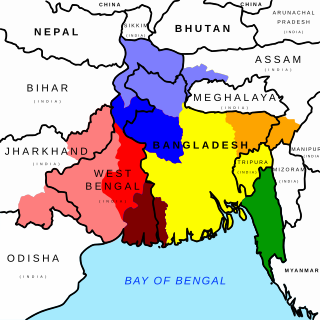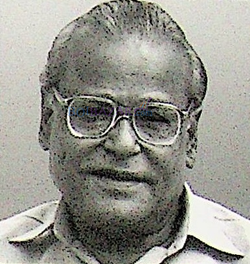Related Research Articles

Politics of Bangladesh takes place in a framework of a parliamentary representative democratic republic, whereby the Prime Minister of Bangladesh is the head of government, and of a multi-party system. Executive power is exercised by the government. Legislative power is vested in both the government and parliament. The Constitution of Bangladesh was written in 1972 and has undergone seventeen amendments.

Sheikh Mujibur Rahman, often shortened as Sheikh Mujib or Mujib, also widely known as Bangabandhu, was the founder of Bangladesh. He first served as the titular president of the Provisional Government of Bangladesh between April 1971 and January 1972. He then served as Prime Minister of Bangladesh from the Awami League between January 1972 and January 1975. He finally served as President again during BAKSAL from January 1975 till his assassination in August 1975. In 2011, the 15th constitutional amendment in Bangladesh referred to Sheikh Mujib as the Father of the Nation who declared independence; these references were enshrined in the fifth, sixth, and seventh schedules of the constitution.
Independence of Bangladesh was declared on 26 March 1971, celebrated as Independence Day, from Pakistan. The Independence Day of Bangladesh is celebrated on 26 March when Sheikh Mujibur Rahman declared the Independence of Bangladesh. The Bangladesh Liberation War started on 26 March and lasted till 16 December 1971 which is celebrated as Victory Day in Bangladesh. There is a dispute along partisan line on who declared the Independence of Bangladesh. The Awami League claim Sheikh Mujibur Rahman while the Bangladesh Nationalist Party claim it was Ziaur Rahman.

Abdul Kader Siddique is a Bangladeshi politician. He is popularly known under the title "Bangabir." He served as a Mukti Bahini member and organizer of the Bangladesh Liberation War. He fought with an estimated 17,000-strong guerrilla force in the Tangail region against the Pakistan Army. The army was called Kaderia Bahini. At the end of the war, in1971, Siddique's forces entered Dhaka along with the Indian forces, signaling the end of the war. He was awarded Bir Uttom by the Government of Bangladesh. Since 1999, he has been serving as the leader of his newly formed party, the Krishak Sramik Janata League.
The Agartala Conspiracy Case was a sedition case in Pakistan during the rule of Ayub Khan against Awami League, brought by the government of Pakistan in 1968 against Sheikh Mujibur Rahman, the then leader of the Awami League and East Pakistan, and 34 other people.
The Swadhin Bangla Biplobi Parishad was an armed underground student political group secretly organized in 1961 by Serajul Alam Khan, a key founder of Bangladesh, that worked to wage an armed secessionist struggle against Pakistani rule and achieve the independence of East Pakistan as "Bangladesh".

The first president of Bangladesh, Sheikh Mujibur Rahman, and most of his family were killed during the early hours of 15 August 1975 by a group of young Bangladesh Army personnel who invaded his Dhanmondi 32 residence as part of a coup d'état. Minister of Commerce Khondaker Mostaq Ahmad immediately took control of the government and proclaimed himself president. The assassination marked the first direct military intervention in Bangladesh's civilian administration-centric politics. 15 August is National Mourning Day, an official national holiday in Bangladesh.

Shawkat Ali was a politician and a leader of the Bengali Language Movement. He was one of the founders of Awami Muslim League - which later became Awami League and is now the Bangladesh Awami League. He was a member of all three Rastrabhasa Sangram Parishad. He was also the Chief Organizer of Dhaka City Awami League during the 1950s. His house in 150, Chawk Moghultuly, Dhaka was the center for many activities and meetings during the Language Movement. He died of a stroke on August 18, 1975. He is buried in Jurain graveyard in Dhaka.

Matiur Rahman Mallik was a Bengali national activist. He was killed by the Pakistani police during 1969 uprising in East Pakistan. He received the Independence Day Award from the Government of Bangladesh in 2018.

Ataur Rahman Khan was a Bangladeshi lawyer, politician and writer, and served as Chief Minister of East Pakistan from 1 September 1956 – March 1958, and as the Prime Minister of Bangladesh from 30 March 1984 to 9 July 1986.

The Bangladesh Chhatra League, formerly known as the East Pakistan Student League, often simply called the Chhatra League, is a students' political organisation in Bangladesh, founded by Sheikh Mujibur Rahman on 4 January 1948. BSL is the student wing of the Bangladesh Awami League.

The history of Bangladesh (1971–present) refers to the period after the independence of Bangladesh from Pakistan.

The 7 March Speech of Bangabandhu was a public speech given by Sheikh Mujibur Rahman, the Founding Father of Bangladesh on 7 March 1971 at the Ramna Race Course in Dhaka to a gathering of over two million (2,000,000) people. It was delivered during a period of escalating tensions between East Pakistan and the powerful political and military establishment of West Pakistan. In the speech, Bangabandhu informally declared the independence of Bangladesh, proclaiming: "The struggle this time, is a struggle for our liberty. The struggle this time, is a struggle for our independence." He announced a civil disobedience movement in the province, calling for "every house to turn into a fortress".

The 1969 mass uprising in East Pakistan was a democratic political movement in East Pakistan. The uprising consisted of a series of mass demonstrations and sporadic conflicts between government armed forces and the demonstrators. Although the unrest began in 1966 with the Six point movement of Awami League, it got momentum at the beginning of 1969 and culminated in the resignation of Field Marshal Ayub Khan, the first military ruler of Pakistan. The uprising also led to the withdrawal of the Agartala Conspiracy Case and acquittal of Sheikh Mujibur Rahman and his colleagues.

Joy Bangla is a slogan and war cry used in Bangladesh and India's West Bengal, Tripura, Barak Valley and Manbhum District to indicate nationalism towards the geopolitical, cultural and historical region of Bengal and Bangamata. It is also recognised as the national slogan of Bangladesh. It translates roughly to "Victory to Bengal" or "Hail Bengal".
The 1990 mass uprising was a democratic movement that took place on 4 December and led to the fall of General Hussain Muhammad Ershad in Bangladesh. The uprising was the result of a series of popular protests that started from 10 October 1990 to topple General Ershad who came to power in 1982 by imposing martial law and replaced a democratically elected President through a bloodless coup.
The non-cooperation movement of 1971 was an historic movement in then East Pakistan by the Awami League and the general public against the military government of Pakistan in March of that year. After the announcement of the suspension of the session of the National Assembly of Pakistan on March 1, the spontaneous movement of the people started, but officially on the call of Sheikh Mujibur Rahman, the non-cooperation movement started on March 2 and continued until March 25. The movement lasted for a total of 25 days. The main objective of this movement was to ensure the autonomy of East Pakistan from the central government of Pakistan. During this period, the control of the central government of West Pakistan over the civilian administration of East Pakistan was almost non-existent. At one stage of the movement, the whole of East Pakistan except the cantonments was practically under the command of Sheikh Mujibur Rahman.

Mafiz Ali Chowdhury (1919–1994) was a Bangladeshi politician who was part of the Bangladesh Awami League and a former Minister and Member of Parliament.
Eleven Points Programme was a charter of demands in East Pakistan that called for reforms and the resignation of President Ayub Khan. It was led by students and was a successor to the Six point movement led by Sheikh Mujibur Rahman.
A series of rallies, demonstrations, and blockades opposing the visit of the Indian Prime Minister Narendra Modi were held in Bangladesh from 19 to 29 March, on the celebration of the birth centenary of Bangabandhu Sheikh Mujibur Rahman and the 50th anniversary of Bangladesh's independence from Pakistan. Accusing Narendra Modi of committing crimes against humanity during the 2002 Gujarat riots, the protesters agitated against what they alleged were India's anti-Muslim policies and India's interference in Bangladeshi politics. Protesters demanded the cancellation of the Bangladesh government's invitation to the Indian Prime Minister. The otherwise peaceful protests turned violent when the protesters were attacked by the supporters of the ruling Awami League party along with a crackdown by the law-enforcement agencies, causing the deaths of several protesters throughout the last week of March 2021 in Bangladesh. Initially launched by progressive student organizations including the Bangladesh Students Union, Bangladesh Sadharon Chhatra Odhikar Songrokkhon Parishad, and the Socialist Students' Front, the demonstrations were later joined by the Islamic group Hefazat-e-Islam Bangladesh.
References
- ↑ "News Details". Bangladesh Sangbad Sangstha. Retrieved 16 January 2018.
- ↑ "Bangabandhu's 7th March speech still inspires | The Asian Age Online, Bangladesh". The Asian Age. Retrieved 16 January 2018.
- ↑ "Smriti Sangrakkhan Parishad recalled the martyrs". bdnews24.com. Retrieved 16 January 2018.
- 1 2 3 Rahman, Gazi Md. Mizanur. "Sarbadaliya Chhatra Sangram Parishad". Banglapedia. Retrieved 16 January 2018.
- ↑ Bates, Crispin; Bates, Senior Lecturer Modern South Asian History Centre for South Asian Studies Crispin (16 September 2013). Subalterns and Raj: South Asia Since 1600. Routledge. p. 189. ISBN 9781134513758.
- ↑ "Give martyrs of 1969 mass upsurge due recognition". The Daily Star. 24 January 2010. Retrieved 16 January 2018.